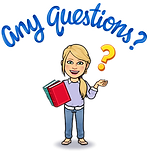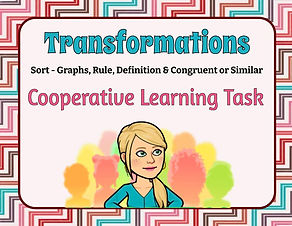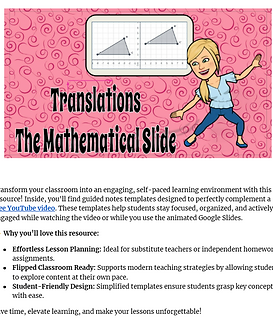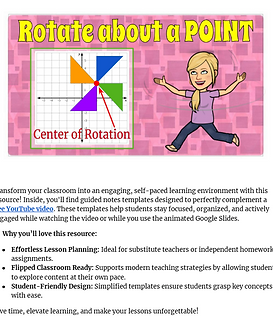Transformations - Flip, Slide, Rotate, and Grow Your Math Skills!
Welcome to our exciting module on transformations in geometry! In this module, we will explore how shapes can move, flip, slide, and change in size, all while maintaining their essential properties. Transformations are not just mathematical concepts; they are all around us in art, architecture, nature, and even video games!
As we dive into this learning module, we'll also deepen our understanding of congruent and similar figures. Congruent figures are exact copies of each other, while similar figures have the same shape but may differ in size. You’ll learn which transformations result in congruent images—like translations, rotations, and reflections—and which ones create similar images, such as dilations.
To make this module engaging and interactive, we will be using the many video lessons below to help you visualize and understand each type of transformation. Each video will introduce a new transformation, complete with demonstrations and practice problems to reinforce your understanding. Get ready to see how transformations can create beautiful patterns, help solve puzzles, and even change the way we look at shapes! So, grab your notebooks, keep an open mind, and let’s dive into the fascinating world of transformations! Your journey into geometry starts now!
Lesson Objective: Students will be able to identify and describe congruent figures and understand the properties of congruence.
Essential Question: How can you determine if two figures are congruent?
Lesson Objective: Students will be able to define and apply translations to figures on the coordinate plane, understanding how the position of a figure changes while maintaining its size and shape.
Essential Question: How does a translation change the position of a figure on the coordinate plane, and how can you describe the movement of a figure after it has been translated?
Check for Understanding: Test your understanding with these end-of-lesson practice problems to reinforce your skills and master the concept!
Lesson Objective: Students will be able to define and apply reflections to figures on the coordinate plane, understanding how a figure is flipped over a line of reflection while maintaining its size and shape.
Essential Question: How does a reflection change the position of a figure on the coordinate plane, and how can you describe the movement of a figure after it has been reflected?
Check for Understanding: Test your understanding with these end-of-lesson practice problems to reinforce your skills and master the concept!
Lesson Objective: Students will be able to define and apply rotations to figures on the coordinate plane, understanding how a figure is rotated around the origin while maintaining its size and shape.
Essential Question: How does a rotation change the position of a figure on the coordinate plane, and how can you describe the movement of a figure after it has been rotated?
Check for Understanding: Test your understanding with these end-of-lesson practice problems to reinforce your skills and master the concept!
Application - Congruent Transformations
Practice Objective: Students will be able to apply multiple congruent transformations, including translations, rotations, and reflections, to geometric figures and demonstrate how these transformations maintain the shape and size of the figures.
Essential Question: How do multiple congruent transformations affect the position and orientation of geometric figures while maintaining their shape and size?
Check for Understanding: Test your understanding with these mid-unit practice problems to reinforce your skills and master the concept!
Lesson Objective: Students will be able to rotate a given geometric figure 90°, 180°, and 270° about a specified point on the coordinate plane, and accurately describe the position of the resulting image using coordinates.
Essential Question: How does rotating a figure about a point differ from rotating it about the origin on the coordinate plane?
Lesson Objective: Students will be able to identify similar figures, name corresponding angles and sides, and find unknown measures using the properties of similar figures.
Essential Question: How can you use a proportion to determine if two figures are similar?
Check for Understanding: Test your understanding with these mid-unit practice problems to reinforce your skills and master the concept!
Lesson Objective: Students will be able to identify dilations and apply them to dilate figures on the coordinate plane.
Essential Question: How can you tell when a dilation is a reduction or an enlargement?
Application - Congruent or Similar?
Practice Objective: Students will be able to apply multiple congruent transformations, including translations, rotations, and reflections, to geometric figures and demonstrate how these transformations maintain the shape and size of the figures.
Essential Question: How do multiple congruent transformations affect the position and orientation of geometric figures while maintaining their shape and size?
Check for Understanding: Test your understanding with these mid-unit practice problems to reinforce your skills and master the concept!











